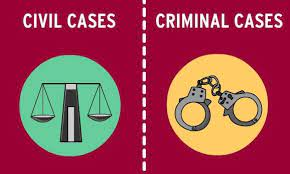INTRODUCTION
Summary judgment, a procedural tool primarily associated with civil litigation, is a rare occurrence in criminal cases. Criminal proceedings, characterized by the prosecution’s burden of proving guilt beyond a reasonable doubt, differ significantly from civil cases. However, in exceptional circumstances, summary judgment can arise even in criminal cases. This essay explores the concept of summary judgment in criminal cases, elucidating its infrequent application, significance, and potential implications.
THE DISTINCTION BETWEEN CIVIL AND CRIMINAL CASES

“Criminal vs. Civil Cases: One seeks justice, the other seeks resolution. Understanding the legal distinctions. ⚖️
Before delving into the concept of summary judgment in criminal cases, it is essential to understand the fundamental differences between civil and criminal litigation:
- Burden of Proof: In civil cases, the burden of proof rests on the plaintiff, and the standard is typically the preponderance of the evidence. In contrast, criminal cases require the prosecution to prove guilt beyond a reasonable doubt, a substantially higher standard.
- Nature of Disputes: Civil cases involve disputes between private parties seeking remedies like damages or injunctions. Criminal cases, on the other hand, involve allegations of criminal conduct by the state against an individual, with the potential for incarceration or other punitive measures.
- Legal Standards: Civil cases often focus on issues of liability and monetary compensation, while criminal cases involve questions of guilt or innocence and the application of criminal statutes.
SUMMARY JUDGMENT IN CRIMINAL CASES
Summary judgment in criminal cases is exceptionally rare due to the unique characteristics and principles governing criminal law. The key reasons for its infrequent application include:
- The Prosecution’s Burden: In criminal cases, the prosecution bears the heavy burden of proving the defendant’s guilt beyond a reasonable doubt. This requires presenting evidence and establishing the defendant’s culpability to the satisfaction of a judge or jury.
- Presumption of Innocence: The presumption of innocence is a cornerstone of criminal law. It places the burden squarely on the prosecution and emphasizes the defendant’s right to a full and fair trial.
- Right to Confrontation: Criminal defendants have a constitutionally protected right to confront and cross-examine witnesses against them. Summary judgment often circumvents this right, as it typically does not involve witness testimony or a full evidentiary examination.
- Severity of Penalties: Criminal cases involve potentially severe penalties, including imprisonment. Given the gravity of these consequences, the legal system places a premium on ensuring a thorough examination of the facts and a fair process.
EXCEPTIONAL CIRCUMSTANCES FOR SUMMARY JUDGMENT IN CRIMINAL CASES
While rare, there are exceptional circumstances in which summary judgment may be considered in criminal cases:
- Legal Insufficiency of the Evidence: If, after the prosecution presents its evidence, it becomes evident that no reasonable jury could find the defendant guilty beyond a reasonable doubt, a judge may consider a motion for summary judgment of acquittal.
- Failure to State an Offense: In some cases, a defendant may argue that even if all the facts presented by the prosecution are true, they do not constitute a criminal offense as a matter of law.
- Mistaken Identity: If the prosecution’s evidence overwhelmingly establishes that the defendant is not the person charged with the crime, summary judgment may be appropriate.
- Double Jeopardy: In rare instances, double jeopardy issues may arise, where a defendant has already been tried or convicted for the same offense. In such cases, summary judgment may be sought to prevent further prosecution.
SIGNIFICANCE AND IMPLICATIONS
The application of summary judgment in criminal cases, while rare, underscores the importance of legal clarity and the requirement that the prosecution meets its high evidentiary burden. When summary judgment is granted in favor of a defendant, it typically results in an acquittal or dismissal of charges, leading to the defendant’s release from custody.
However, it is crucial to recognize that summary judgment in criminal cases is not a shortcut to justice or a means to bypass the full trial process. Instead, it is a safeguard against wrongful convictions and a recognition that, in certain circumstances, the evidence is insufficient to proceed with a trial.
CONCLUSION
Summary judgment in criminal cases is indeed a rarity, reserved for exceptional circumstances where the prosecution’s case is legally insufficient. The unique characteristics of criminal law, including the presumption of innocence, the burden of proof, and the severity of penalties, make summary judgment an unusual occurrence. Nevertheless, its infrequent application serves as a reminder of the legal system’s commitment to ensuring that justice is served, and individuals are afforded their due process rights, even in the face of criminal allegations.
